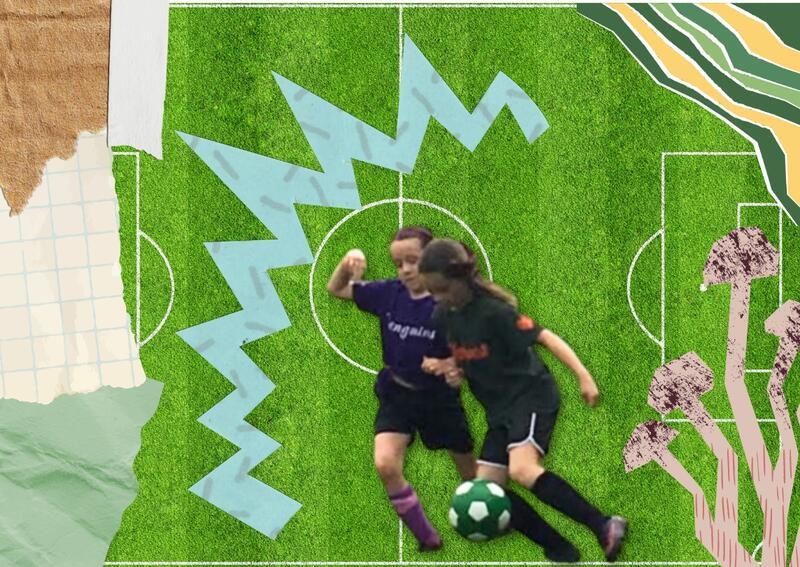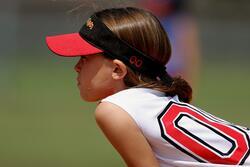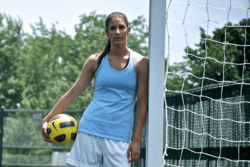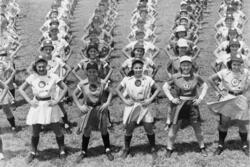Athletic Like a Jew
Shoes little and attitude large, six-year-old me swaggered onto the soccer field like it was the biggest stadium in town. I ambled around, not being able to discern my left from right, shooting on unsuspecting goalies, and drinking obscene amounts of Gatorade.
I felt like every girl on that field was one and the same. In reality, the majority of my team was some denomination of Christian, leaving me the sole Jew – that would’ve astounded my six-year-old self to know. I thought that Jewish people made up the bulk of the country, because in what world were my people not the main character? I was also the only girl who didn’t go to the public elementary our team was affiliated with, as I attended a Jewish day school from kindergarten through fifth grade. My younger self wasn’t aware of these principal differences, let alone able to analyze them. All I knew was that I was the fastest kid on the field.
At least, I was the fastest kid on the field until a new girl joined our team. The new girl was faster. I remember the new girl and I dribbling the too-small soccer ball with our too-small feet before our first game as I introduced myself and attempted to figure out who this mystery addition was. The man in black and white stripes blew his whistle and told us to find our captains and begin gameplay. This girl flew. She and I were the right wing and striker combination to beat. I let myself indulge in an extra Gatorade that day.
My dad, watching enthusiastically from the sidelines, wrapped me in a hug after our win. Eyes shining and jersey drenched with sweat, I couldn’t wait to tell him about this new girl: “Did you see how fast she was?” My dad nodded and began to illustrate how we blew across the field together, getting excited at the prospect of my new friend.
I tilted my tiny head back and decided I had come to a conclusion. “Hey Dad, guess what?” I prodded his jacket in the way little kids do when they want attention. When he finally regarded me, I did the big reveal: “She’s Jewish!” My dad looked at me in slight confusion, wondering how his daughter could possibly obtain that information based on this girl’s athletic performance. He asked me why I thought that. I told him it was obvious: she was fast.
At age six, I subconsciously associated strength with Jewish women. I assigned the role of Jew to anyone and everyone who displayed characteristics of intelligence or ability, since I thought of my religion as a positive, something that gestured toward greatness. This association came from the many strong Jewish women in the Torah and my own life, who I aspired to be like and who I saw as great. When I was smaller and more idealistic, I idolized these women because of simple characteristics they embodied, like their resilience or leadership abilities.
Now that I’ve become more aware of the world around me, however, I also appreciate the strength these women hold in the face of adversity. Being a female in a world dominated by and built for men is strikingly challenging to navigate. Part of my role model selection process at age six was unknowingly rooted in singling out women who never let their gendered disadvantage discourage them from greatness.
For example, my mom is one of my biggest role models. She has amazing fortitude and never shies away from conflict even if others claim it’s “too controversial.” She balances life as a mother, professor, and wife with an ease to be admired. In addition to my mom, my grandmothers, aunts, cousins, and friends hold themselves with poise and participate in such high-level intellectual debates that I have constant reminders around me of what a Jewish woman is capable of.
The Torah, whose stories I’ve been able to recite since pre-kindergarten, provides me with many shining examples of strong Jewish women. I dressed as Queen Vashti for Purim in the third grade because I admired her independence. I remember her now because of the strength she exhibited when she said no to a man in power, something that can be both very difficult and potentially dangerous in our patriarchal society. Miriam kept spirits high and inspired the Israelite women to sing and dance as they were crossing the Red Sea. She was a beacon of light during a time of darkness, and one of the earliest prominent female leaders in the Torah. Another strong woman from our ancient Jewish past is Deborah, an Israeli prophet and the only female judge presented to us in the Tanakh.
Finally, and perhaps most importantly for my early soccer-playing self, there are many female athletes who influenced my idea that physical strength is a Jewish trait. Aly Raisman, who I would obligate myself to cheer for during the Olympics because she’s “just like me,” and who I later learned courageously spoke out against sexual abuse from her team doctor Larry Nassar. Sue Bird, Charlotte Epstein, and Alix Klineman are other names that come to mind when I picture a strong female athlete. And although they’re not Jewish, members of the US women's soccer team such as Megan Rapinoe and Alex Morgan continue to remind me that women do not deserve less because of their gender; they made me proud to be female from a young age.
Being surrounded by Jewish women molded me into a little girl who knew that Judaism was a strength. Learning about so many powerful, opinionated, and proudly loud women, both from the Torah and my life, made me appreciate both my gender identity and religion.
As it turns out, that new girl on my soccer team wasn’t Jewish. She didn’t go to synagogue, didn’t celebrate the High Holidays, and didn’t hold Shabbat dinners where she begged for refills of bottomless grape juice.
But I did. I did all of that and I also played in soccer games on Sunday afternoons. And because I was a Jew, I always scored.
This piece was written as part of JWA’s Rising Voices Fellowship.







